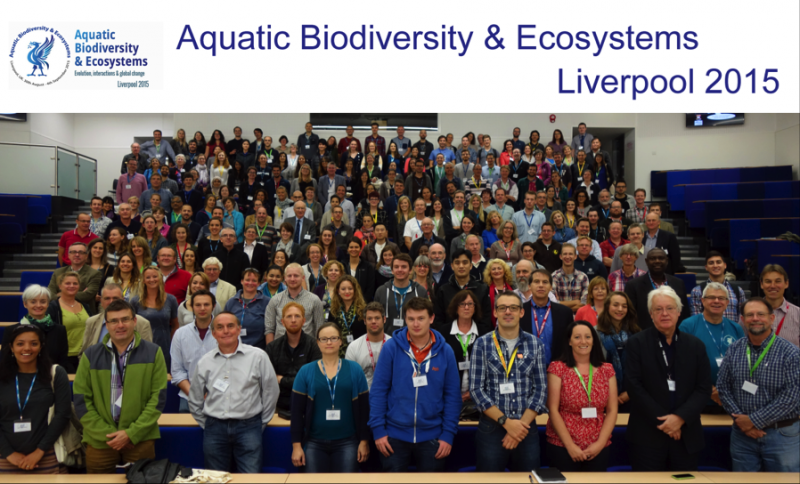Aquatic Biodiversity and Ecosystems Conference 2015: Liverpool
Rebecca Atkins
University of Georgia (USA) and Swansea University (UK)

The Aquatic Biodiversity and Ecosystems Conference (ABEC) was an incredible undertaking for all those involved in its organization. Building off of a previous conference that took place in 1990, ABEC was organized to both reflect upon the past 25 years of marine and aquatic research, and also to set the stage for future work and collaborative efforts. Having yet to attend an international conference, I was unsure of what to expect.
ABEC surpassed all of my expectations, encompassing a breadth of disciplines and actively seeking to bring together a diverse group of researchers, both established and emerging. The city of Liverpool, with its rich history and an abundance of pubs, was a brilliant choice to not only host this eclectic gathering, but to also foster dynamic interactions and collaborations. Amidst several days of contributed and invited talks, were a smattering of lively tea breaks, special topics workshops, and an exciting evening of pub exploration. Throughout this time, I had numerous opportunities to attend a variety of presentations. I was able to converse with researchers who shared similar interests and enthusiasm, while also networking with fellow graduate students from around the world. As a first year PhD student, attending ABEC gave me the motivation to continue exploring my ideas, expanding my perspectives, and seeking input from others. I also took another stab at conquering my fear of public speaking by presenting both a talk and a poster. Both were well received and resulted in insightful feedback.
One additional, and personally rewarding, result of this conference was earning recognition for both best student oral presentation (first place) and best student poster (third place). This was truly an honor that I will not forget. Being surrounded by a global network of scientists, enjoying a vibrant city, and talking about innovative and engaging research has instilled within me the desire to continue fostering broader collaborative efforts that seek to answer globally relevant questions.
I am extremely grateful to the Challenger Society for giving me such an incredible opportunity, and for allowing me to experience my first conference abroad. Having attended, I feel that I have formed a number of valuable professional and academic connections, which will likely result in future collaborative work outside of my host institution. I have also gained greater confidence in my ability as a researcher, and I’m excited to convey my experiences to peers back at my home institution. Personal profile: I am a first year PhD student at the University of Georgia. Currently, my systems of interest include salt marshes and the rocky shore. I enjoy the dynamic nature of coastal ecosystems, and hope to better understand how intraspecific variation in consumer and resource populations leads to variation in food web interaction strengths and structure. More information about my research interests and academic background can be found on my website: Rebeccaatkins.com
Latest News
Royal Society Publishing Photography Competition 2025
Please see a message from the Royal Society below:
We are delighted to announce that the 2025 Competition is now open for entries until 15 August for a chance to win £1000! The competition celebrates the power of photography in conveying the wonder of science happening all around us and photographs can be submitted in the categories of: Astronomy, Behaviour, Earth Science and Climatology, Ecology and Environmental Science, and Microimaging.
The competition is free to enter and open to anyone studying or working in science at graduate level or above. Category winners will receive a one-year membership to the Royal Photographic Society and the overall winner will receive a grand prize of £1,000. Find out more: https://bit.ly/RSPphotocomp
October 2025 MEDIN Workshop: Marine Data Management, Governance and the MEDIN toolset
The Marine Environmental Data and Information Network (MEDIN) are pleased to announce that registration is now open for the next occurrence of our popular free online training workshop: ‘Marine Data Management, Governance and the MEDIN toolset’ on the 13th – 17th October 2025 on OceanTeacher Global Academy.
Marine Data Management, Governance and the MEDIN toolset
The Marine Environmental Data and Information Network (MEDIN) and OceanWise are delighted to invite you to attend our popular free online training workshop: ‘Marine Data Management, Governance and the MEDIN toolset’ on the 19th – 23rd of May 2025.
